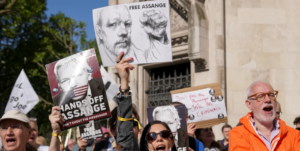 London, Great Britain.- The UK High Court has ruled that Julian Assange has the right to appeal in his final challenge against extradition to the United States. The legal victory for the WikiLeaks founder was celebrated by hundreds of his supporters as they rallied outside the court in the British capital.
London, Great Britain.- The UK High Court has ruled that Julian Assange has the right to appeal in his final challenge against extradition to the United States. The legal victory for the WikiLeaks founder was celebrated by hundreds of his supporters as they rallied outside the court in the British capital.
Assange’s legal team argued in Monday’s hearing that the judges, Victoria Sharp and Jeremy Johnson, should not accept the assurances given by US prosecutors that he could seek to rely upon the rights and protections under the US First Amendment.
His team made the case that Assange could be discriminated against on the basis of his nationality, as an Australian-born foreign national.
In a short ruling, the judges said the U.S. submissions were not sufficient, granting Assange permission to a full appeal in relation to the points on freedom of speech and nationality.
The 52-year-old is wanted by U.S. authorities on espionage charges connected to his organization’s publication of thousands of classified documents and diplomatic cables in 2010 and 2011. Assange faces spending the rest of his life behind bars if convicted.
In March, the London court delayed its decision on an extradition as the judges sought a series of assurances, around the First Amendment protections and the death penalty.
The United States will not seek a death penalty if Assange is extradited, the High Court was told on Monday. “The United States assures that he will not be tried for a death-eligible offence,” according to documents submitted by lawyers representing the U.S. government.
WikiLeaks Editor-in-Chief Kristinn Hrafnsson described Assange’s case and the judicial process as “rigged” to reporters last Wednesday. “This is institutional corruption on a judicial level. Julian Assange is a political prisoner,” he said.
It has been 12 years since the Australian has lived freely.
Assange has spent the past five years in London’s high-security Belmarsh prison and nearly seven years before that holed up at the Ecuadorian embassy in the city trying to avoid arrest. He and his supporters around the world maintain his extradition is clearly politically motivated.
Alan Rusbridger, editor of the UK political monthly Prospect Magazine, wrote in an op-ed for CNN that working with Assange was “often a bumpy ride” but that their collaboration while he was still the Guardian’s editor-in-chief was “groundbreaking.”
He added that the U.S. case looks “like a very belated attempt to punish whistleblowers and discourage journalists, whether conventional or not, from poking their noses where they’re not welcome.”